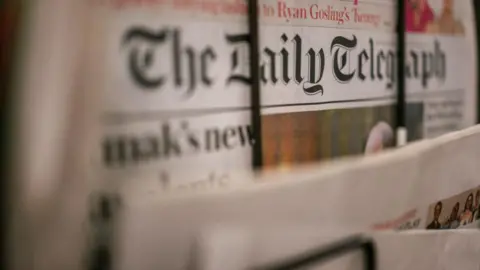In a significant turn of events in the media landscape, the Daily Telegraph and its Sunday counterpart are set to be acquired by the American private equity firm RedBird Capital Partners. This move follows a prolonged period of uncertainty stemming from ownership disputes and the ramifications of the previous government’s legislation that limited foreign ownership in British media.
The deal entails RedBird Capital purchasing shares currently held by Sheikh Mansour bin Zayed Sultan al-Nahyan, an Emirati royal who previously backed a bid to take control of the Telegraph titles but was ultimately unsuccessful. Notably, this earlier attempt faced obstacles due to a law introduced by the government that barred foreign nations from controlling British newspapers and magazines. Now, the most recent proposal, which aims to remove the ownership vacuum that has persisted for two years, awaits regulatory approval before it can proceed.
The Telegraph newspapers, along with the Spectator magazine, were announced for auction by Lloyds Bank, which took control of the assets from the Barclay family due to their inability to repay debts. RedBird Capital, in collaboration with the Sheikh’s investment corporation, had previously attempted to buy the Telegraph titles by completely settling the debts owed by the Barclays. However, this move proved counterproductive as the significant financial backing provided by Sheikh Mansour’s IMI (International Media Investments) prompted government intervention, inhibiting them from acquiring majority control.
It’s anticipated that IMI will still hold a minor interest in the Telegraph, estimated to be under 15%. In a related development, the Spectator magazine was sold last year to hedge fund billionaire Sir Paul Marshall for £100 million, which further highlights the shifting dynamics in the ownership of these prominent British media outlets.
According to reports from the BBC, RedBird’s acquisition price is structured in a manner that ensures IMI will recover its investment in full. This transaction culminates a two-year limbo for the Telegraph staff, who expressed their anxieties regarding the lack of investment and strategic guidance during this transitional phase.
RedBird Capital’s founder, Gerry Cardinale, has conveyed ambitious plans to enhance the Telegraph’s visibility and subscriber numbers in the American market, asserting that there exists an unmet demand for robust news services. His previous investments include the Italian football club AC Milan, showcasing a diversified approach to his ventures beyond media.
Cardinale’s strategy could indicate a significant expansion effort, with the potential to reshape the Telegraph’s presence across the Atlantic, thereby aligning it with broader trends where traditional media is seeking both innovation and international reach.
The sale not only represents a notable shift in ownership for these influential publications but also highlights the ongoing battle between local ownership and international investment in the media sector. In an era where independent voices and traditional journalism face numerous challenges, the trajectory of the Telegraph under RedBird’s stewardship will be closely monitored by industry observers and stakeholders.
As the media landscape continues to evolve, the implications of this sale may resonate beyond the confines of the Telegraph’s newsroom, affecting how news is produced, consumed, and perceived, particularly within the UK and potentially in the larger global context.



